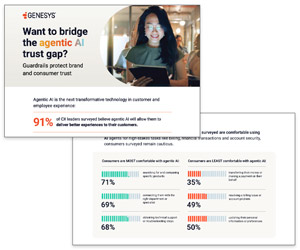Tom Eggemeier of Genesys discusses three elements that are key to a great customer experience.
It’s that time of year when business industry pundits start making their predictions for 2019. Digital transformation is a top trend, of course, and seems destined to affect the customer experience as much as anything else. Add digital ethics and privacy concerns (a Gartner top 10 technology trend) to the mix and we’re in for an interesting year.
All of this makes me think back to how much simpler things were when I was a kid and my grandparents owned a corner grocery in Northern Kentucky. Even though they didn’t use the words “customer experience” back then, providing great service was critical to their success – and my grandparents were really good at it. They knew their customers by name and who needed what, when. People trusted them to get it right.
For example, one gentleman came in every Thursday to buy sandwiches for his work crew. My grandparents knew what the men liked and had everything ready to pick up when the customer walked in the door. Now that’s genuine personalised service.
I enjoyed the same kind of service when I lived in France for five years. The owners of my neighbourhood grocery store, dry cleaner, and other shops got to know me and my habits and anticipated my needs. I trusted them and they made me feel important. There’s nothing better.
Although great customer experiences from the “neighbourhood store” have dwindled in the last 40 or 50 years, technology has put us at the edge of being able to bring them back, i.e. market like the corner shop. We can get to know customers well enough to tailor the experience based on what they want and need.
Of course, customers must be willing to share a certain amount of personal information, but many are okay with that. In fact, Accenture Strategy research shows almost one-third of consumers expect the companies they do business with to know more about them, and two-thirds are willing to share personal information in exchange for perceived value.
The prerequisite, however, is trust. Nearly 90 percent of global consumers think it’s important for companies to protect information privacy. Almost 60 percent would switch half or more of their spending to companies that are great at personalising experiences while maintaining trust.
How to walk the fine line between personalising an experience and intruding on someone’s privacy has been debated for years. Mary Meeker, the investor and author known for her shrewd insights on the internet and new technologies put the issue in the spotlight in her annual report on internet trends. She said we face a “privacy paradox”, where tech companies must use more data to improve customer experiences, yet do it without violating privacy. She pointed out that as users spend more time and money on services, scrutiny rises on all sides.
Regulators are getting involved to make sure data is not used improperly, as with the European Union’s General Data Protection Regulation (GDPR), which took effect May 25, 2018, and California’s new data privacy law going into effect in January 2020. The laws are complex, but the overall goals are to strengthen personal data protection, give consumers more transparency and control over their information and penalise companies for non-compliance. Boil it all down – and it comes back to trust.
Despite the hype and hand-wringing over GDPR restrictions, we at Genesys don’t think regulations like these stop companies from talking or marketing to customers. In fact, they encourage companies to rethink how people want to be communicated with and find better, more thoughtful approaches.
Granted, GDPR prevents companies from misusing information to talk to consumers they don’t really know. It gives customers the right to be “forgotten” and tell companies to delete their personal data. It imposes new data security measures and breach disclosure requirements. But even with these stricter rules, we see the regulation as a positive step toward rebuilding trust with consumers, which leads to better experiences and, ultimately, increased sales.
So, what’s next on the journey to balance personalisation and privacy to earn customers’ trust? First, we think companies should look at the kinds of regulations being proposed and enacted, and pre-emptively adjust their policies to reflect those limitations. A good practice is to think about how we want to be treated ourselves and then use information legitimately to make life better for customers.
Second, we believe companies must keep honing personalisation so it delivers real meaning and value. Someone who bought a three-month supply of flea powder for their dog probably appreciates a reminder when it’s about time to buy again. But if the same customer bought a dog carrier with a lifetime warranty, asking him if he wants to buy another one a month later will only create frustration. Delivering true personalisation at scale requires immense data intelligence.
AI, machine learning and other technology advancements will continue to prove to be our “rosetta stone” in this matter. The trick will be striking the right balance: make it personal enough to be perceived as good while not invading privacy. A colleague of mine who attended the Gartner Digital Marketing Conference said one of the speakers likened AI to a three-month-old baby. The potential is enormous, but it will take time and nurturing to develop it into practical customer experience applications that people deem trustworthy.

Tom Eggemeier
Finally, companies must respect the permissions customers give them. Many websites, including ours, now have a pop-up box saying they use cookies with links to the privacy policy. Most people click “accept” and move on, but we think the onus is on companies to use those permissions wisely and not let personalisation become intrusive. This is part of the implied two-way contract where customers are happy for companies to communicate with them in the proper way.
The customer experience is as critical to success in today’s digital world as it was in my grandparents’ grocery 40 years ago. The right balance of personalisation and privacy to engender trust is a winning formula that never goes out of style.
Author: Robyn Coppell
Published On: 10th Jan 2019 - Last modified: 15th Jan 2019
Read more about - Guest Blogs, Genesys








































